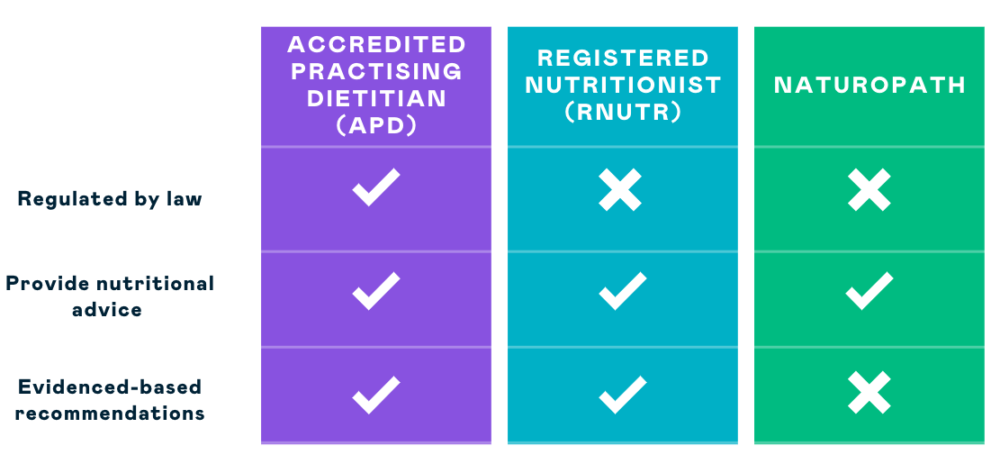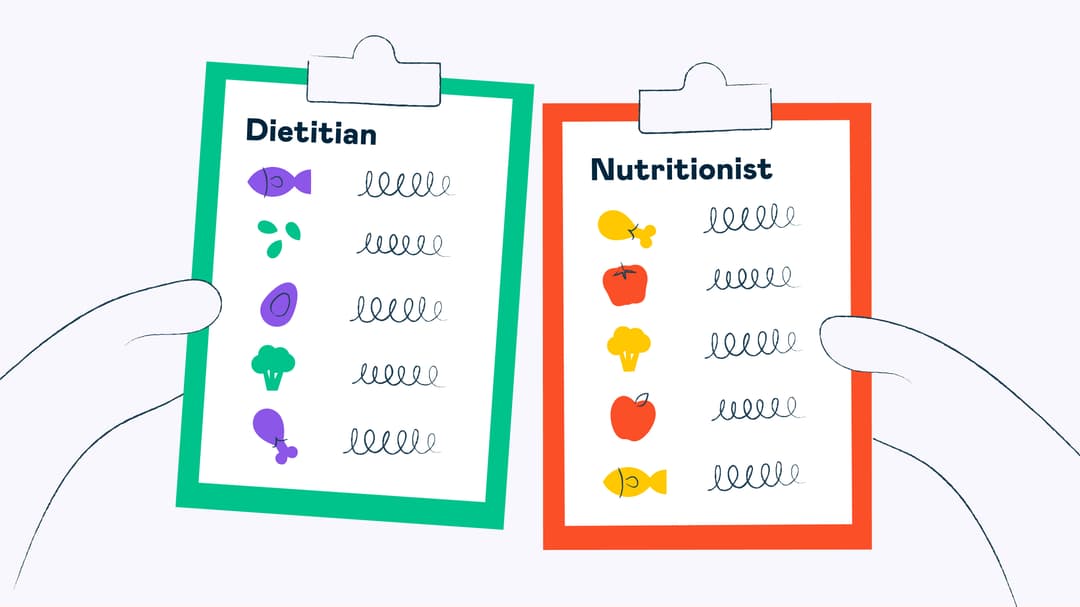You might have been confused by seeing the different terms nutritionist, dietitian, and naturopath.
When you are looking for a professional to help you make healthy lifestyle changes or change your diet, it is important to understand the difference between these titles.
The titles dietitian, nutritionist, and naturopath are all used for professional purposes, but each hold very different qualifications and registrations.
This guide will explain in detail the differences between nutrition professionals and help you make an informed decision about what is best for you.
Medication-assisted weight loss with a future focus
Start with Mounjaro, transition to habit-based health with our support

Accredited Practising Dietitian (APD)
Dietitians are university-qualified professionals who undertake ongoing training and education to ensure they provide up-to-date, evidence-based nutrition information.
Dietitians are the only nutrition professionals to be governed and regulated by law. This means that anyone who uses the dietitian title must be registered with the correct professional body and adhere to their standards, otherwise, they will be penalised with legal action.
In Australia, dietitians must be registered with Dietitians Association and be part of the Accredited Practising Dietitian (APD) program. This program requires dietitians to meet ongoing professional development and competencies each year to maintain their APD status.
Only dietitians who have APD accreditation are recognised by Medicare, the Department of Veterans’ Affairs (DVA) and private health insurers in Australia.
Dietitians provide practical guidance, to both healthy and sick individuals, to help people make appropriate, healthy choices. They often work as part of a clinical team (including doctors, nurses, physiotherapists etc) to treat complex health conditions such as diabetes, allergies, IBS, eating disorders, chronic fatigue, malnutrition, kidney failure and bowel disorders.
Other areas that dietitians often work in include the food industry, workplace, catering, education, sport and the media, and public health relations.
Registered Nutritionist (RNutr)
The title nutritionist can be used by dietitians, nutrition scientists and nutrition graduates as well as those with little to no qualifications in nutrition. Therefore it is important to choose a Registered Nutritionist, as this indicates the individual has a higher standard of professional training in nutrition.
The Nutrition Society of Australia (NSA) has a register of nutritionists that recognise and encourage high standards of professional training in nutrition. Individuals must hold a Bachelor degree with a major in nutrition, at minimum, to apply for registration. Once registered, these individuals can identify themselves as experienced and qualified in nutrition science with a post nominal of RNutr. This title is voluntary within Australia.
Registered nutritionists are qualified to provide information and advice about food and healthy eating, but not about special diets for medical conditions. Those with a medical condition could see a registered nutritionist as part of a medical team (including GPs, doctors, nurses etc).
Naturopaths
Naturopaths practice alternative medicine that is based on traditional or folk medicine, rather than evidence-based medicine. Alternative medicine is less regulated, and less rigorously tested when compared with conventional medicine.
Naturopaths provide recommendations for diet and lifestyle in order to reduce or prevent health issues and illnesses. They also promote improved mental health through spiritual and emotional guidance.
Treatment methods can include high dose vitamins, detoxing, food avoidance, and supplements for which currently there’s little scientific evidence.
The Naturopathic profession is not currently recognised as a registered profession under the Australian Health Practitioner Regulation Agency (AHPRA) and naturopaths are not currently regulated in Australia.
There are no formal prerequisites for becoming a Naturopath, however, some naturopaths will have an Advanced Diploma in Naturopathy or a Bachelor’s Degree in Health Science.
Key differences
To highlight and summarise the key differences between dietitians, registered nutritionists, and naturopath:

Alternative option
If you are looking to make healthy changes and lose some weight, seeking the help of a nutrition professional is a great way to do so. The challenge with seeing a nutritionist professional is that you often have to take a few hours out of your week to travel to and from the session and have the consultation. There are also travelling expenses associated with face-to-face consultations.
While there may be options for both online and face-to-face appointments it might still cost the same amount. On top of this, you’re limited to your appointment slot rather than getting support as and when you need it.
For this reason, many people prefer the convenience of an online program, where they can communicate with their dietitian or registered nutritionist around their busy lifestyle.
Second Nature is a digital program that helps you to lose weight and make sustainable lifestyle changes. Second Nature combines support from dietitians and registered nutritionists with the convenience of an app-based program.
Many people are more familiar with Noom or Weight Watchers, so we created a guide comparing their digital programs with Second Nature to help you decide what’s best for you.
The Second Nature program focuses on three areas that lead to long-term habit change: tracking, support, and education. When you sign up for the program, you receive:
- Daily support from a dietitian or registered nutritionist (your health coach)
- A digital peer support group
- 2-week, risk-free trial
- Hundreds of in-app recipe, including videos
- Daily educational articles
- Meal planning and journaling tools
Second Nature tackles weight loss by focusing on your habits and changing your behaviours. This means that any healthy lifestyle changes you make will be sustainable and last in the long term.
Take a look at our Trustpilot reviews to understand what members think of the program.

Pricing
Monthly face-to-face consultations with a dietitian, nutritionist, or naturopath at a clinic can be very expensive ($100+/hour).
We have compared the prices of visiting any private nutrition clinic with the Second Nature program in the table below:
| Weekly Nutritionist | Second Nature | |
| Price | $100+ / month | $75 / month |
Take home message
- Dietitians are the only health professionals regulated and protected by law.
- Only dietitians are required to hold a nationally recognised degree.
- The title ‘nutritionist’ is not protected in Australia, meaning anyone can call themselves a nutritionist even if they have no nutrition qualifications.
- Registered nutritionists hold a higher standard of professional training in nutrition. They can provide evidence-based advice and information about food and healthy eating.
- Naturopaths practice alternative medicine that is based on traditional or folk medicine, rather than evidence-based medicine.
- Naturopaths are currently not regulated in Australia and the Naturopathic profession is not currently recognised as a registered profession under the Australian Health Practitioner Regulation Agency (AHPRA).
- Second Nature provides a cheaper, more convenient alternative to face-to-face consultations from an Accredited Practising Dietitian or registered nutritionist.


